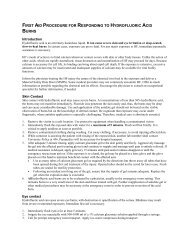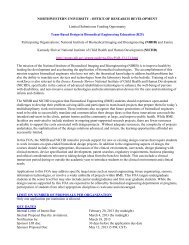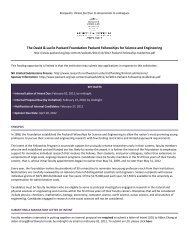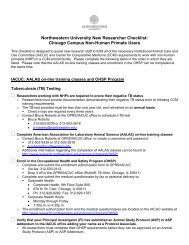annual report 2011 - Office for Research - Northwestern University
annual report 2011 - Office for Research - Northwestern University
annual report 2011 - Office for Research - Northwestern University
You also want an ePaper? Increase the reach of your titles
YUMPU automatically turns print PDFs into web optimized ePapers that Google loves.
Dan P. McAdams<br />
School of Education and Social Policy and<br />
Weinberg College of Arts and Sciences<br />
Narratives of Redemption<br />
Who are the adults making the most positive impact<br />
on young people today? What are the psychological<br />
characteristics of the most caring and productive members<br />
of American society? Funded by grants from the Foley<br />
Family Foundation and the Templeton Foundation, Dan<br />
P. McAdams, human development and social policy and<br />
psychology, studies the lives and the life stories of highly<br />
generative American adults. Especially generative men<br />
and women are committed to promoting the well-being<br />
of the next generation and leaving a positive legacy <strong>for</strong><br />
the future.<br />
McAdams and his students have shown that highly<br />
generative American adults tend to see their own lives<br />
as narratives of redemption. In a redemptive story, the<br />
protagonist is repeatedly delivered from suffering into<br />
an enhanced status or state. Redemptive personal stories<br />
provide a psychological resource <strong>for</strong> generative adults,<br />
sustaining their hope that hard work to benefit others today<br />
will pay dividends in the future. In creating redemptive<br />
44 Annual Report <strong>2011</strong> | Excellence in <strong>Research</strong><br />
Andrew Campbell<br />
stories <strong>for</strong> their own lives, American adults shape their<br />
personal experiences to certain common narrative <strong>for</strong>ms<br />
that enjoy tremendous favor in American society, such as<br />
stories of atonement (from sin to salvation), upward social<br />
mobility (from rags to riches), personal emancipation<br />
(from enslavement to freedom), and recovery (from illness,<br />
addiction, or abuse to the full actualization of the good<br />
inner self).<br />
Although redemptive stories in American life foster<br />
generative behavior and sustain hope <strong>for</strong> many adults, there<br />
can sometimes be a dark side to redemption. In some cases,<br />
redemptive narratives can border on self-righteousness<br />
and arrogance. The hero of the story may feel that it is his<br />
or her manifest destiny to trans<strong>for</strong>m or save the world in<br />
some way, even when the world strongly resists. McAdams<br />
explored the potentially dark side of redemption in his<br />
recently published psychological biography George W. Bush<br />
and the Redemptive Dream: A Psychological Portrait (Ox<strong>for</strong>d<br />
<strong>University</strong> Press, <strong>2011</strong>). In the book McAdams argues that<br />
President Bush’s personal narrative of redemption helped<br />
him achieve political success and personal fulfillment, but<br />
the same story also led directly and tragically to his decision<br />
to launch a preemptive military invasion of Iraq.

















